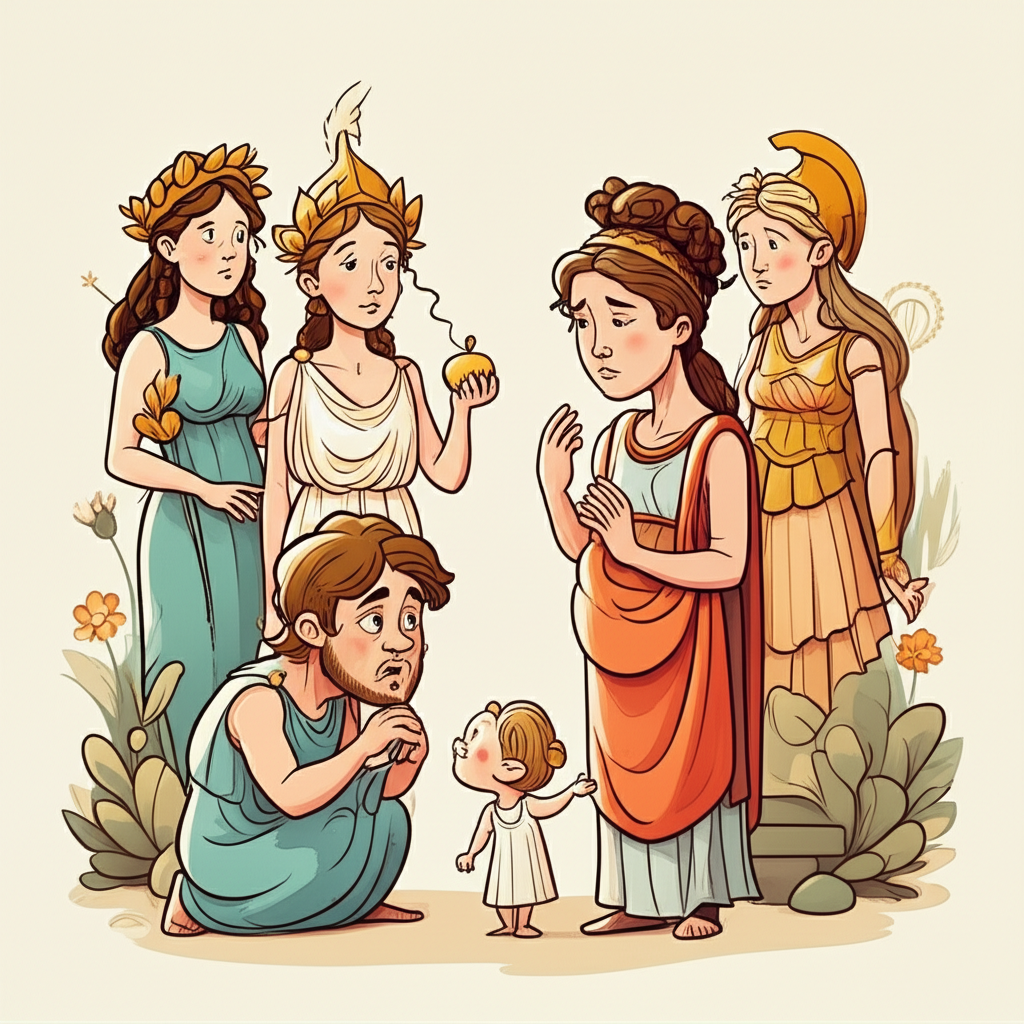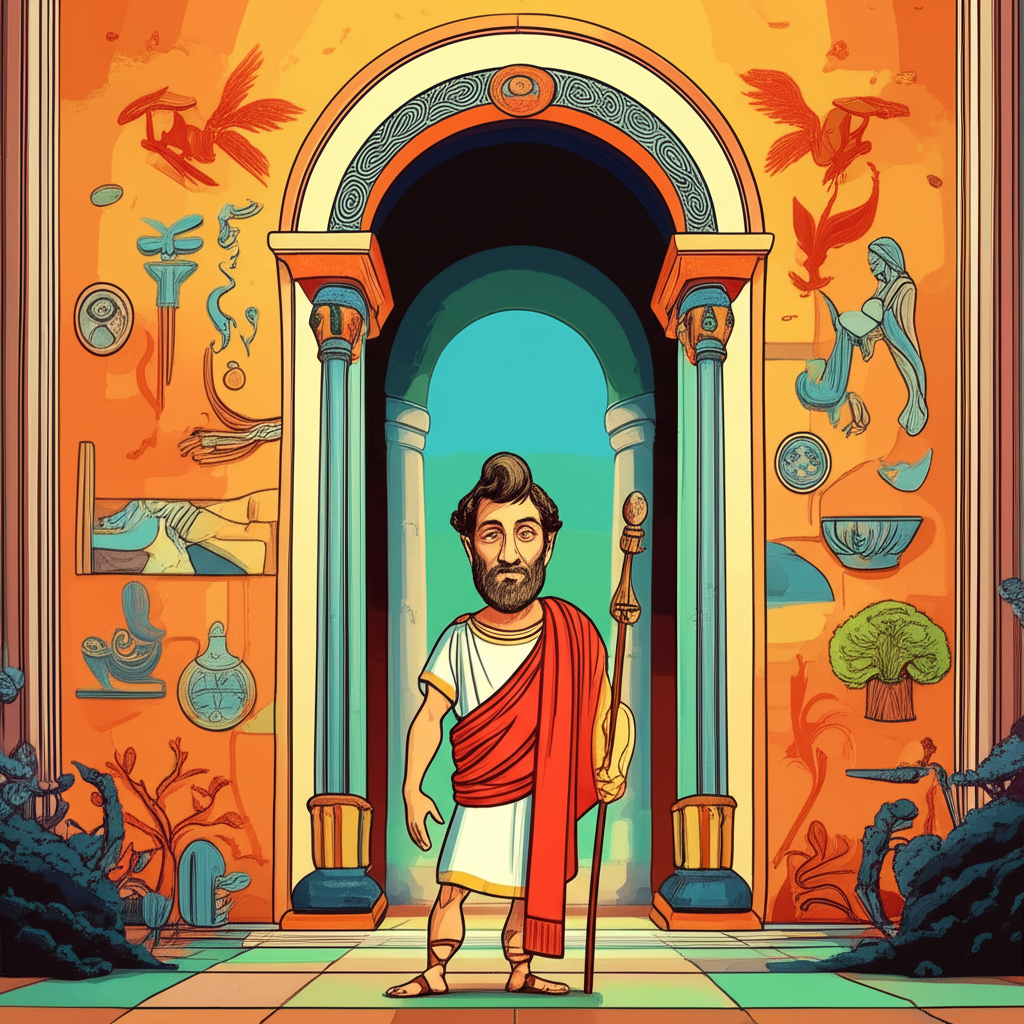
Hestia’s Quiet Refusal: The Unspoken Oath of the Judgment of Paris
Introduction
Among the grand and tumultuous sagas of ancient Greek mythology, the story of the Trojan War stands as a monumental epic of heroism, tragedy, and divine intervention. Its origins are famously traced back to a single, fateful event: the Judgment of Paris. This tale, a cornerstone of Western literature, tells of a contest of vanity between three powerful goddesses. Yet, in the celestial court of Mount Olympus, one of the most senior and respected goddesses was conspicuously absent from this dispute. This is the story of Hestia, the goddess of the hearth, and her quiet, profound refusal to participate—a decision rooted in an unspoken oath that defined her very essence. This narrative is a traditional story, a product of the rich imagination of the ancient Greek people, passed down through generations not as a matter of faith, but as a way to explore complex human and societal values.
Origins and Cultural Background
This myth originates from the world of Ancient Greece, a civilization that flourished thousands of years ago in the Mediterranean. The ancient Greeks lived in a world where the forces of nature and the complexities of human emotion were often unpredictable and overwhelming. To make sense of their existence, they developed a rich tapestry of stories featuring a pantheon of gods and goddesses who resided on Mount Olympus. These deities were not distant, perfect beings; they were anthropomorphic, embodying human traits like jealousy, pride, love, and wisdom, but on a cosmic scale. Their stories served as a framework for understanding everything from the changing of the seasons to the morality of human actions. In this society, myths were a form of cultural education, entertainment, and philosophical exploration, explaining why the world was the way it was and what role humanity played within it.
Character Description
Hestia is one of the twelve Olympians and, in most accounts, the firstborn child of the Titans Cronus and Rhea. Despite her seniority, she is often the most understated and reserved of the gods. Hestia is the goddess of the hearth, the home, the family, and the foundational center of community life. Her symbolic attribute is the eternal flame of the hearth, which was present in every Greek home and in the public buildings of every city-state (the prytaneum). This flame was not merely for warmth or cooking; it represented stability, continuity, and the sacred bond of family and society.
Unlike many other gods and goddesses who were embroiled in constant drama and conflict, Hestia chose a path of peace. To avoid the forced marriages and rivalries that plagued Olympus, she made a sacred vow to her brother Zeus to remain an eternal virgin. This oath was not just about chastity; it was a declaration of her autonomy and her commitment to her domain, which required her to be a neutral, stabilizing presence. She represented the calm, unwavering center around which the chaotic lives of gods and mortals revolved. She was the anchor, the point of stillness in a world of turmoil.
Main Story / Narrative Retelling
The grandest wedding Olympus had ever witnessed was in full swing. The sea-nymph Thetis was marrying the mortal king Peleus, and every deity, great and small, had been invited to the festivities on Mount Pelion. Laughter and music echoed through the clouds as gods mingled with mortals in a rare moment of harmony. Every deity, that is, except one. Eris, the goddess of discord, had been deliberately excluded, for her very presence was a harbinger of strife.
Spurned and furious, Eris crafted a plan for revenge. She appeared at the edge of the celebration, unseen, and rolled a gleaming golden apple among the guests. Inscribed upon its perfect surface were the words: ΤΗΙ ΚΑΛΛΙΣΤΗΙ—"To the Fairest."
Silence fell as the apple came to a stop. Then, the inevitable occurred. Three of the most powerful goddesses on Olympus each stepped forward to claim it. First was Hera, the majestic Queen of the Gods, wife of Zeus, who saw the apple as her right by station and authority. Second was Athena, the formidable goddess of wisdom and warfare, whose beauty was one of intellect and strength. And third was Aphrodite, the radiant goddess of love and beauty, for whom the title of "Fairest" was the very definition of her being.
The ensuing argument threatened to shatter the wedding’s joy. Zeus, caught between his wife, his daughter, and another powerful goddess, wisely refused to act as judge. He knew any choice would bring the eternal wrath of the other two upon him. Instead, he declared that a mortal must decide, one known for his fair judgment: Paris, a shepherd prince of Troy.
As Hera, Athena, and Aphrodite prepared to descend to Earth to present their cases to the young prince, Hermes, the messenger god, paused. He looked around the Olympian court and noticed a profound stillness in one corner. There, by the great central hearth of Olympus, sat Hestia. The fire before her burned with a steady, gentle light, its warmth a stark contrast to the heated glares being exchanged by the three contestants. She had not moved, not spoken, not even glanced at the golden apple.
Hermes, curious, approached her. "Lady Hestia," he said respectfully, "The apple of Eris has caused a great rift. Will you not put forth your claim? You are the eldest, an original Olympian of great reverence. Surely the title of ‘Fairest’ is as much yours to claim as any."
Hestia looked up from the flames, her eyes holding a deep, ancient peace. She offered a soft, knowing smile. "My domain, swift Hermes, is not one of comparison," she replied, her voice as calm as the fire she tended. "To be the ‘fairest’ is to be judged by another’s eyes, to seek validation from the outside. But my value lies within. It is in the warmth that greets a family at the end of the day, in the sacred fire that unites a city, in the peace of a home protected from the storms of the world."
She gestured towards the three goddesses, who were now preening and preparing their bribes for the mortal judge. "Their contest is one of pride and power over others. Hera will offer kingdoms, Athena will offer victory, and Aphrodite will offer a beauty to match her own. These are prizes of the external world—of conquest, glory, and passion. They are fleeting."
Hestia then stood, her presence radiating a quiet authority that needed no golden apple to affirm it. "Long ago," she continued, "I swore an oath to remain apart from such rivalries. My vow was to preserve my own domain, the sanctuary of the hearth, from the very conflicts this apple was designed to create. To join this contest would be to betray that oath. It would be to declare that the stability of the home can be weighed against the glory of a crown or the passion of a fleeting romance. My judgment was made long ago, not by a shepherd prince, but by my own will. I choose the hearth. I choose peace. I choose permanence. Let them have their contest. I will remain here, to keep the fire burning for whoever returns, broken and weary from the war that this vanity will inevitably unleash."
And so, Hestia remained on Olympus. Her refusal was not an act of cowardice or disinterest, but a profound statement—an oath of non-judgment. While the other three goddesses traveled to Mount Ida to bribe Paris, leading to the abduction of Helen and the decade-long Trojan War that would lay waste to a great city, Hestia’s flame burned on, a silent, unwavering symbol of the peace that had been forsaken for a moment of vanity.
Symbolism and Meaning
To the ancient Greeks, Hestia’s absence from this pivotal myth was deeply symbolic. It represented the fundamental conflict between the public and private spheres, between external ambition and internal stability. Hera, Athena, and Aphrodite represented external powers: political authority, military might, and romantic desire. Their competition for the apple symbolized the chaotic, destructive nature of ego, pride, and the quest for external validation.
Hestia, in contrast, symbolized the importance of the home (oikos) as the foundation of civilization. Her refusal to participate was a moral lesson: the true center of life, the source of stability and community, should not be compromised by the pursuit of personal glory. For a society often defined by warfare between city-states, the story served as a powerful reminder that without the stability of the hearth—without family, community, and inner peace—all the kingdoms and victories in the world were meaningless. Hestia’s quiet power was the bedrock upon which everything else was built, and to neglect it was to invite ruin.
Modern Perspective
Today, the figure of Hestia and her role (or non-role) in myths like the Judgment of Paris are interpreted through various modern lenses. In cultural and feminist studies, Hestia is often viewed as a figure of female autonomy. She is a goddess who finds power not through marriage, conflict, or the approval of others, but through her own defined purpose. She rejects being judged by a man based on her appearance and refuses to compete with other women, offering a powerful alternative to the patriarchal narratives common in mythology.
In literature, her character has been explored as a symbol of quiet strength. A notable example is in Rick Riordan’s Percy Jackson & The Olympians series, where Hestia is depicted as a young girl tending a hearth, often overlooked but ultimately revealed as "the Last Olympian," the keeper of hope and home when all else is lost. This portrayal captures the essence of her mythological role: the humble, essential force that endures when the more glamorous powers falter.
Conclusion
The story of Hestia and the Judgment of Paris is a fascinating piece of cultural heritage, a narrative crafted by an ancient people to explore timeless human dilemmas. It is a myth, a product of imagination, and is not intended to be understood as a literal or factual account. As Muslims, we recognize that only Allah is the true Creator and Sustainer, the sole source of all power and reality.
Nevertheless, by examining such stories, we gain a deeper understanding of human history and the diverse ways in which cultures have sought to make sense of the world. The tale of Hestia’s quiet refusal serves as a powerful testament to the enduring value of peace, stability, and inner conviction—themes that resonate far beyond the ancient world. It reminds us that sometimes, the greatest strength lies not in joining the fray, but in tending the quiet flame within.




